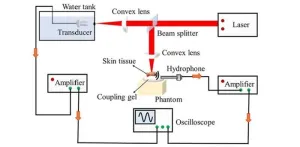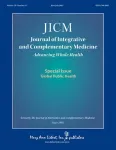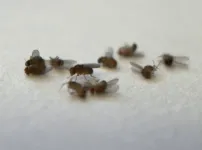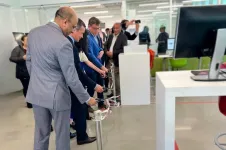(Press-News.org) Think fast: if you’re running a race and overtake the person in second place, what position are you in? Many people instinctively respond that you’re in first place. However, upon reflection, some people realize the correct answer is that you’re now in second place: the former number-two runner slipped into third as you overtook them.
Trick questions of this kind are invaluable to cognitive scientists because they shed light on the cognitive quirks that shape our decision-making. “These aren’t just trick questions,” explained Nick Byrd, a philosopher-scientist and Intelligence Community Fellow who led the research at Stevens Institute of Technology. “They’re opportunities to reveal whether we are thinking reflectively — sometimes we are lured into accepting faulty responses that feel right.”
In their work, Byrd’s team worked with research startup Phonic, Inc., to develop an online protocol for recording audio as people narrate all of their thoughts while answering a series of trick questions. The work, reported in a special issue of the Journal of Intelligence, may not only help scientist reveal how people solve reasoning problems, but help optimize analysts’ reports and briefings that inform high-level decisions.
“The mind is often a black box, and figuring out what’s going on inside is challenging,” Byrd explained. “Brain imaging is useful, but we can also learn a great deal simply by asking people to say whatever they’re thinking.”
However, think-out-loud experiments come at a cost: Recording people thinking out loud is much more complex and time-consuming than surveys. “It took three of us three months to complete an in-person think-aloud study — and just one of us three hours to complete an online survey with the same number of subjects,” Byrd said.
The new tool will significantly decrease the amount of time for completing think-out-loud experiments, lifting the lid on the black box for how humans overcome trick questions.
The paper shows that both online and in-person think-aloud testing can offer valuable insights into subjects’ cognitive world. Many researchers focus on whether subjects fall for the trick or give correct answers, assuming that arriving at correct responses involved careful reflection and falling for the tricks did not. In the think-aloud recordings, however, Byrd’s team found that in as many as 31% of cases, the opposite was true. “Sometimes people were tricked despite thinking reflectively, and sometimes people were correct without reflecting,” Byrd said.
Presented with the race-position question, for instance, one subject gave the correct answer almost immediately — then explained that it was easy for them, since they’d run track in high school. “It turns out that with enough relevant experience you can answer quickly without falling for the lure,” Byrd said. “That might sound like a trivial insight, but higher education’s publish-or-perish environment discourages scientists from using resource-intensive methods like think-aloud protocols to detect and quantify such measurement error.”
Having shown that online surveys can streamline think-aloud audio collection, Byrd and colleagues now hope to use AI tools to streamline the analysis, making it possible to quickly record and interpret think-aloud data. That added efficiency would enable more researchers to conduct larger studies, study more diverse and representative groups of people, and obtain greater confidence in their results.
“One complaint about psychological science is its focus on student research participants in countries like the United States, who aren’t necessarily representative of the whole of humanity,” Byrd said. “Our online method will enable researchers to reach anyone with a smartphone and an internet connection, which includes most of the world’s population.”
The stakes can be high in decision-making: the U.S. Intelligence Community pays close attention to techniques that overcome faulty thinking. “If you’re making important decisions, our think-aloud recordings show that people were much more likely to overcome mistakes if they questioned their initial impulse and considered some reasons,” Byrd said. “So, helping scientists reveal how people solve reasoning problems may improve not only our decision science, but also our decision-making.”
END
What’s an underrated way to study decisions? Think out loud
Researchers developed an online protocol for recording audio of people thinking aloud when trying to overcome trick questions
2023-06-13
ELSE PRESS RELEASES FROM THIS DATE:
Pass the salt: This space rock holds clues as to how Earth got its water
2023-06-13
Sodium chloride, better known as table salt, isn't exactly the type of mineral that captures the imagination of scientists. However, a smattering of tiny salt crystals discovered in a sample from an asteroid has researchers at the University of Arizona Lunar and Planetary Laboratory excited, because these crystals can only have formed in the presence of liquid water.
Even more intriguing, according to the research team, is the fact that the sample comes from an S-type asteroid, a category known to mostly lack hydrated, or water-bearing, minerals. The discovery strongly suggests ...
Understanding tumor microenvironment with photoacoustic spectral analysis
2023-06-13
Tumors are not just isolated clumps of abnormal cells but are associated with more complex system known as the “tumor microenvironment” (TME). Over the past few years, research has revealed that the TME consists of a complex combination of blood vessels, connective tissue, and a matrix of extracellular proteins and molecules. Most importantly, the composition of the TME is different from that of nearby healthy tissues. In particular, the lipid and collagen contents of tumors differ from those of normal tissues, making them important potential biomarkers for diagnosing various types of ...
Special issue of JICM on global public health and the Declaration of Astana
2023-06-13
A special focus issue of the peer-reviewed Journal of Integrative and Complementary Medicine (JICM) on Global Public Health is a response to the Declaration of Astana, developed by the World Health Organization and UNICEF. With contributions from traditional, complementary, and integrative medicine (TCIM) scholars and thought leaders around the world, the issue showcases research and scholarship examining the opportunities and challenges that TCIM approaches offer global health to governments and health service providers seeking to fulfill ...
ASU establishes ʻĀkoʻakoʻa, a new collaborative effort to seed renewed connection between human and coral communities in Hawaiʻi
2023-06-13
With a group of core partners, Arizona State University is creating a new $25 million collaboration to preserve and restore vitality to Hawaiʻi’s coral reefs and the health of its coastlines.
The community-based effort looks to fuse state-of-the-art science programs with the leadership and cultural knowledge of Hawaiʻi’s community partners to enable coastal and reef sustainability for generations to come. Named ʻĀkoʻakoʻa (pronounced ah kō-a kō-a), the effort shares a dual meaning ʻto assemble’ and ‘coral.’
“For ...
Men and women with migraine both carry an increased risk of ischemic stroke
2023-06-13
Women and men who experience migraine headaches also carry an elevated risk of having an ischemic stroke, but women alone may carry an additional risk of heart attack and hemorrhagic stroke, according to a new study led by Cecilia Hvitfeldt Fuglsang of Aarhus University, Denmark publishing June 13th in the open access journal PLOS Medicine.
People diagnosed with migraine are believed to have a higher risk of experiencing a heart attack or stroke before the age of 60. Previous studies have suggested ...
How seeing corpses reduces the lifespan of flies
2023-06-13
Researchers led by Christi Gendron at the University of Michigan, US, have found the link between death perception and reduced aging in flies. Their new study, published June 13th in the open access journal PLOS Biology shows that a specific group of brain cells in the fly, called R2 and R4 neurons, are activated when flies encounter other dead flies, and that this increased activity leads to more rapid aging.
Aging is a complex process that can be affected by both genetics and the environment. While we know that perceptual experiences can affect ...
Study develops primer scheme for human monkeypox virus that can be plugged into currently existing amplicon-based sequencing and bioinformatics infrastructure
2023-06-13
Study develops primer scheme for human monkeypox virus that can be plugged into currently existing amplicon-based sequencing and bioinformatics infrastructure; this approach has enabled public health laboratories to quickly adapt their genomic workflows in response to a newly emerging pathogen.
#####
In your coverage, please use this URL to provide access to the freely available paper in PLOS Biology: http://journals.plos.org/plosbiology/article?id=10.1371/journal.pbio.3002151
Article Title: Development of an amplicon-based sequencing approach in response ...
Key regulator of COVID viral receptor may be new drug target
2023-06-13
Entry of the SARS-CoV-2 virus into human tissues depends on the activity of a host gene that regulates production of a key viral receptor, according to a study publishing June 13th in the open access journal PLOS Biology by Madison Strine and Craig Wilen of Yale University, US, and colleagues. The finding provides important new information on how the virus responsible for COVID-19 causes infection and may lead to new antiviral treatments.
In previous work, the authors identified the gene DYRK1A as critical for SARS-CoV-2 pathogenesis. The gene encodes a kinase, a type of enzyme, and had been previously implicated in regulating cell proliferation ...
Illinois Tech earns prestigious recognition as Dassault Systèmes Global 3DX Education Center of Excellence
2023-06-13
CHICAGO—June 13, 2023—Illinois Institute of Technology (Illinois Tech) has been named as a Dassault Systèmes Global 3DEXPERIENCE (3DX) Education Centers of Excellence, a prominent distinction achieved by only three universities in the United States.
On May 11, Illinois Tech recognized this esteemed recognition with the unveiling of a plaque in the newly-launched 3DEXPERIENCE demonstration space. This prestigious honor places Illinois Tech at the forefront of educational institutions leveraging the most advanced digital technology tools and amplifies Illinois Tech's role in equipping ...
Powering the future: UH professor to use NSF Career Award for game-changing research
2023-06-13
In today's dynamic environment where electricity demand is skyrocketing, power converters are the unsung heroes quietly transforming the way we harness and utilize electrical energy and seamlessly fueling our daily lives – from the ubiquitous wall chargers powering up everything from laptops to cell phones to integral parts of electrical systems that keep offshore wind turbines spinning. By 2030, over 80% of electricity is expected to flow through power converters, creating a pressing need to extend their operational lifetime.
“Without power conversion, you cannot really get energy from or efficiently from solar panels and wind turbines, you cannot charge electric ...
LAST 30 PRESS RELEASES:
Twist-controlled magnetism grows beyond the moiré
Root microbes could help oak trees adapt to drought
Emergency department–initiated buprenorphine for opioid use disorder
Call for action on understudied lung cancer in never-smokers
Different visual experiences give rise to different neural wiring
Wearable trackers can detect depression relapse weeks before it returns, study finds
Air pollution and the progression of physical function limitations and disability in aging adults
Historically Black college or university attendance and cognition in US Black adults
New “crucial” advance for quantum computers: researchers manage to read information stored in Majorana qubits
7,000 years of change: How humans reshaped Caribbean coral reef food chains
Virus-based therapy boosts anti-cancer immune responses to brain cancer
Ancient fish ear stones reveal modern Caribbean reefs have lost their dietary complexity
American College of Lifestyle Medicine announces updated dietary position statement for treatment and prevention of chronic disease
New findings highlight two decades of evidence supporting pecans in heart-healthy diets
Case report explores potential link between mRNA COVID-19 vaccines and cancer
Healthy versions of low-carb and low-fat diets linked to better cardiovascular and metabolic health
Low-carb and low-fat diets associated with lower heart disease risk if rich in high-quality, plant-based foods, low in animal products
ASH publishes clinical practice guidelines on frontline and relapsed/refractory management of all in adolescents and young adults
City of Hope research spotlight, January 2026
Keeping an eagle eye on carbon stored in the ocean
FAU study: Tiny worm offers clues to combat chemotherapy neurotoxicity
The ACMG Foundation 2026 Early Career Travel Award is presented to Bianca Seminotti, Ph.D.
Rural cancer patients do just as well when having surgery close to home
New biosensor technology could improve glucose monitoring
Successful press conference for Special Issue II of the JSE Himalayas Series
Hair extensions contain many more dangerous chemicals than previously thought
Elevated lead levels could flow from some US drinking water kiosks
Fragile X study uncovers brainwave biomarker bridging humans and mice
Robots that can see around corners using radio signals and AI
A non-invasive therapeutic strategy for improving bone healing in aged patients
[Press-News.org] What’s an underrated way to study decisions? Think out loudResearchers developed an online protocol for recording audio of people thinking aloud when trying to overcome trick questions











